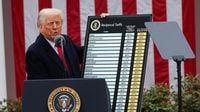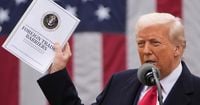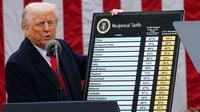On April 2, 2025, U.S. President Donald Trump announced a sweeping new tariff package that is set to significantly impact international trade, particularly with the European Union (EU). During a ceremony in the Rose Garden of the White House, Trump declared a universal 10% tariff on most imports to the United States, with additional tariffs imposed on specific countries based on their trade deficits with the U.S. This move has sparked immediate concern among economists and business leaders, who warn of potential repercussions for both American consumers and the global economy.
"This day will go down in history as the day American industry was reborn, the day America reclaimed its destiny, and the day we began to make America rich again," Trump proclaimed, referring to the announcement as the "Day of Liberation." He criticized previous trade practices, claiming that for decades, the U.S. had been exploited by both friendly and hostile nations. Trump's aggressive approach to tariffs marks a continuation of his policy from his first term, where he similarly imposed tariffs on steel and aluminum imports.
In addition to the blanket 10% tariff, Trump announced that imports from the EU would face a 20% tariff, while countries like China would incur tariffs as high as 34%. Other nations would see tariffs ranging from 24% for Japan to 49% for Cambodia. The new tariffs on vehicles and auto parts, already set at 25%, are expected to take effect immediately, with tariffs on auto parts scheduled for May 3, 2025. This tariff package is viewed as one of the most aggressive steps in U.S. trade policy in recent history.
The announcement has already had a noticeable effect on the stock market, with several exchange-traded funds (ETFs) tracking U.S. indices experiencing declines. As of April 2, an ETF on the S&P 500 lost approximately 2%, while the Nasdaq fell by about 3%. The Dow Jones index also saw a decline of around 1%. These reactions reflect the market's concerns over the potential for a trade war, particularly with the EU, which has been a significant trading partner for the U.S.
Leaders across the EU have reacted strongly to Trump's announcement. Bernd Lange, chairman of the Trade Committee in the European Parliament, stated that the EU is well-prepared for the U.S. tariffs and has already compiled a list of potential countermeasures. Lange warned that Trump's measures could lead to an economic downturn for both the U.S. and the global economy, describing the day as a "Day of Inflation" for ordinary Americans.
Furthermore, Hildegard Müller, president of the German Association of the Automotive Industry, criticized the U.S. tariffs as a fundamental shift away from a rules-based global trading system. She emphasized that such protectionist measures would create losers on both sides of the Atlantic and could exacerbate inflation and consumer prices in the U.S.
Trump's administration argues that the new tariffs are necessary to correct trade imbalances and protect American jobs. However, many economists are skeptical, suggesting that the tariffs will ultimately raise prices for consumers and could lead to job losses in industries reliant on imports. Dirk Jandura, president of the BGA (Federal Association of Wholesale, Foreign Trade, and Services), expressed concerns that the tariffs would result in price increases, leading to potential revenue declines for businesses.
As the situation develops, the EU has indicated it will respond with its own tariffs. The European Commission has prepared a list of U.S. products that could be subject to additional tariffs, which may include whiskey, motorcycles, and various consumer goods. The EU argues that it has been a fair trading partner and that Trump's unilateral tariff measures are unjustified.
In a broader context, Trump's tariff strategy reflects a significant shift in U.S. trade policy, moving away from multilateral agreements and towards a more isolationist approach. The President's focus on tariffs as a tool for economic policy has raised eyebrows among international leaders, who fear that escalating trade tensions could lead to a global recession.
As the U.S. prepares to implement these tariffs, the potential for retaliation from affected countries looms large. Many experts believe that a trade war could ensue, with both sides imposing increasingly punitive measures against each other. This scenario raises concerns about the stability of the global trading system and the economic wellbeing of consumers worldwide.
In conclusion, Trump's announcement of new tariffs marks a pivotal moment in U.S. trade policy, with far-reaching implications for the economy and international relations. As the U.S. embarks on this new path, the reactions from global markets and trade partners will be closely monitored, as the potential for a trade war could reshape the landscape of international commerce.








